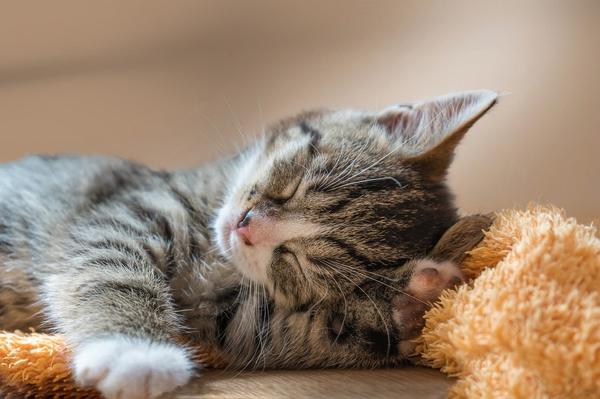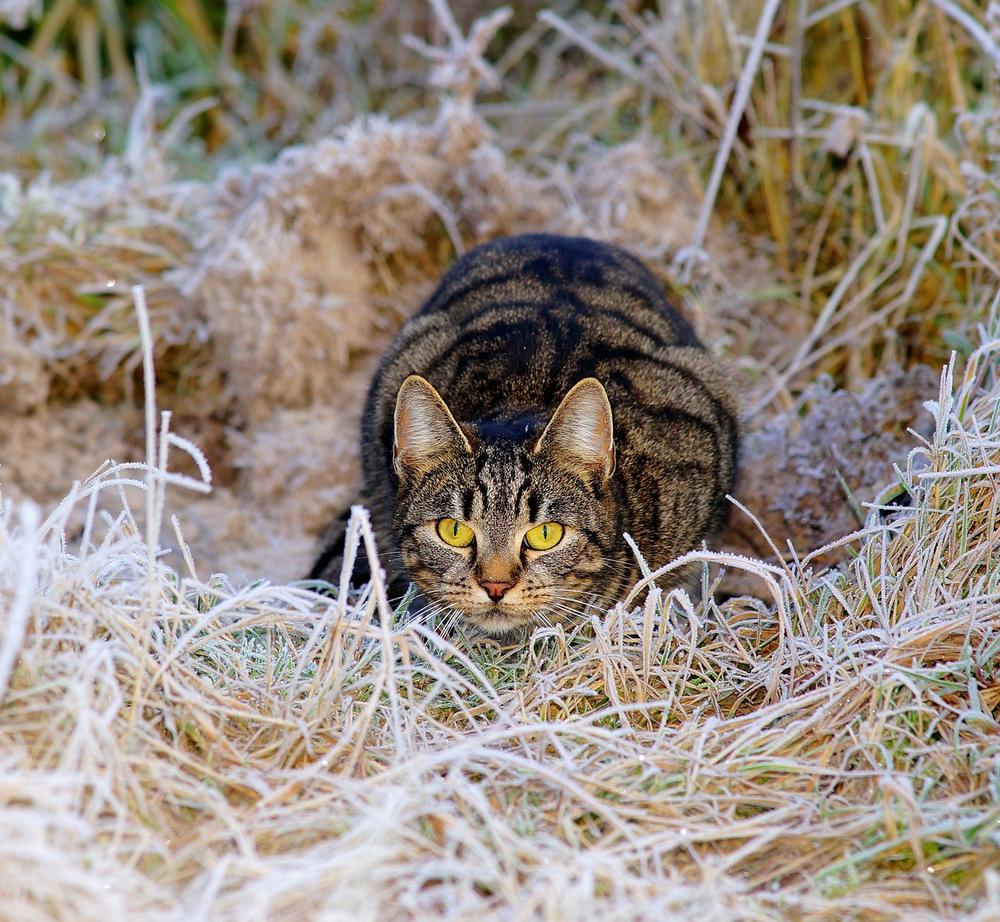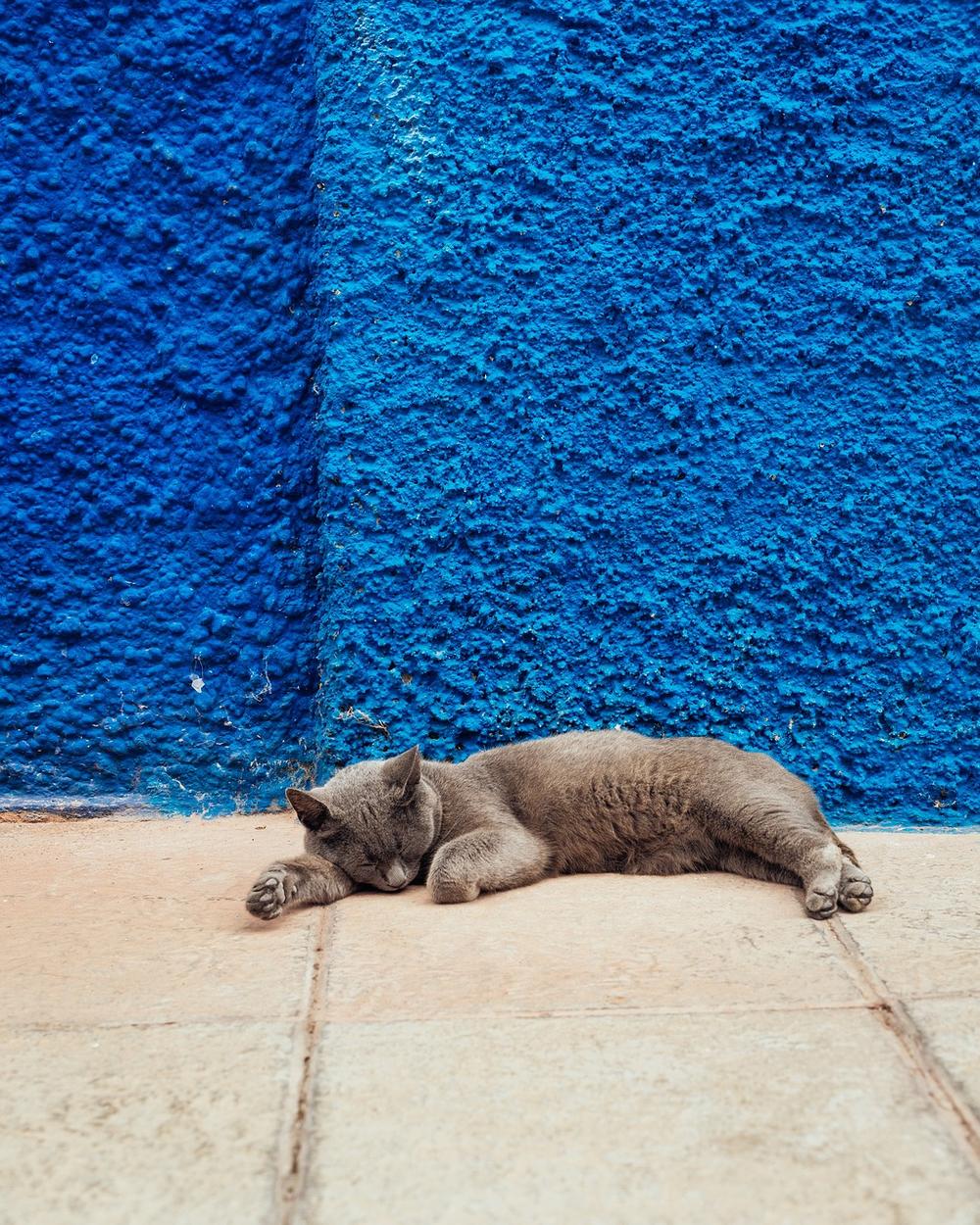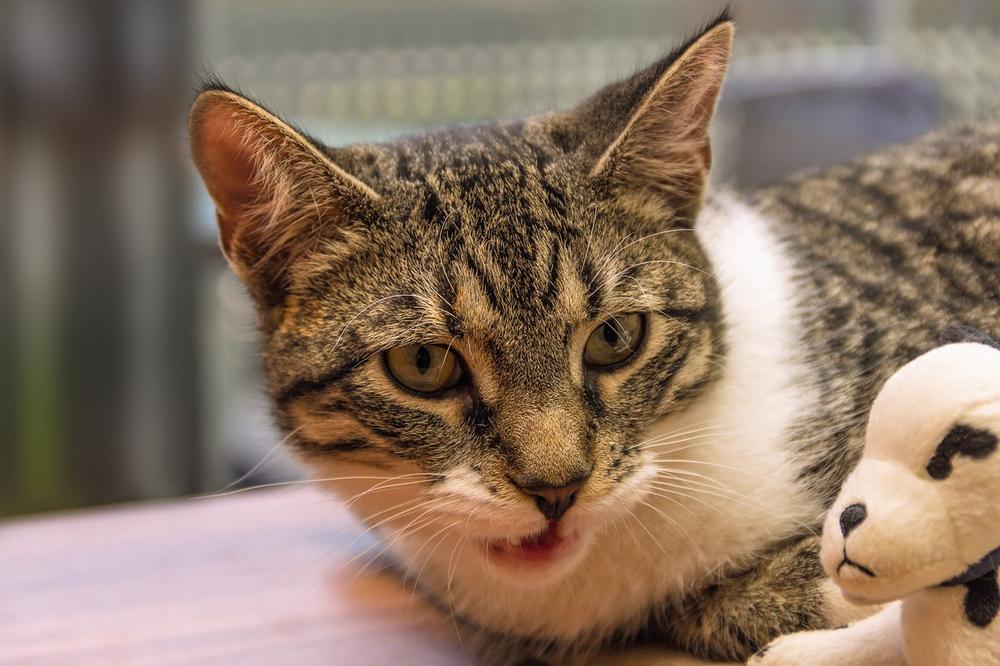Why Does Your Cat Bite You When You Sleep?

Do you feel that?
The sudden pain shooting through your arm.
The frustration of being woken up from a sound sleep.
The confusion of why your cat turns into a midnight vampire. 😼
Well, you're not alone.
Keep reading and let's unravel this feline mystery.
Sleep Disturbance: Consequences of Fear or Anxiety
Create a cozy sleep environment for your cat
You know, cats are amazing creatures. Even when they are sleeping, they are always alert and ready to pounce at any noise or movement they perceive as a threat. However, sometimes this natural instinct can disturb both you and your furry friend's peaceful night's sleep.
One common issue is when your cat bites you while you're asleep, thinking there's an emergency that needs your attention. To prevent these late-night nibbles, try closing the bedroom door. This way, you'll have some peace of mind knowing your cat won't disturb your sleep, and you both can enjoy a good rest.
Another important aspect of creating a comfortable sleep environment is providing your cat with a soft bed and using calming scents like lavender.
Cats love cozy spaces, and these simple additions can significantly improve their sleep quality.
Establish a regular feeding routine before bedtime
Hungry cats can be restless, tossing and turning all night long.
To ensure your feline friend goes to sleep with a full tummy and stays satisfied throughout the night, you ought to establish a regular feeding routine before bedtime.
Now, how do you feed your cat without disturbing your own sleep?

Well, here's where technology comes to the rescue—automatic cat feeders!
These handy devices allow your cat easy access to food, even when you're not around. With an automatic feeder, you can sleep peacefully, knowing that your cat won't wake you up with hunger-induced meows.
Address the underlying causes of aggression
Sometimes, biting during sleep can indicate deeper issues.
Your cat might feel nervous, defensive, or threatened.
Moreover, past mistreatment could be a contributing factor.
If aggressive behavior continues, you should address the root causes. Are there scary or unfamiliar stimuli in your cat's environment?
Is your cat afraid of certain changes in their surroundings?
Could your mental health or emotional instability be affecting your cat?
By understanding these factors and working on solutions, you will greatly improve your feline friend's sleep—and yours too.
Main points I'll expand upon further down this article:
- Pay attention to signs of feline aggression after biting.
- Hunger relief is critical; address their need for food.
- Sudden changes in behavior may indicate a health problem.
- Consider seeking help from a feline ethologist.
- Keep a diary or use a camera to determine the cause.
- Seek medical treatment for deep and bloody bites.
- Restlessness and boredom can contribute to biting behavior at night.
- Spend quality time and engage in activities with your cat.
- Training and setting boundaries are important in preventing biting.
- New people or animals entering the home can trigger biting behavior.
And now, let's move on to some practical steps you can take to ensure your cat's well-being and prevent sleep disturbances...
Feline Medical Issues and Their Behavioral Impact
Here are some quick and useful tips to help you better understand your cat's medical issues and their impact on behavior:
- Take a moment every now and then to check your cat's teeth and gums. It's important for their dental health.
- If you spot any dental issues, don't hesitate to reach out to a veterinarian and get their professional advice.
- Pay close attention to how your cat behaves after biting. It can tell you a lot about their overall temperament.
- Watch out for signs of aggression such as hissing or drooping ears. These actions might indicate that something is bothering your cat.
- Keep in mind, female cats with litters and male cats can be more prone to aggression due to hormonal factors. 😺
- If your cat's behavior suddenly changes, it could be a sign of an underlying health problem. Trust your instincts.
- When you notice a drastic change in your cat's behavior, it's wise to schedule a visit to the vet. They'll be able to assess the situation properly.
- If necessary, consider reaching out to a feline ethologist. These experts specialize in understanding cat behavior and can provide valuable guidance.
- Remember, sometimes hunger can contribute to biting behavior. Your cat might just be trying to let you know they want more food.
- Gentle bites often mean your cat is politely asking for more food. It's their way of communicating with you, so pay attention.
- On the other hand, deep bites suggest anger or aggression. This might signal a deeper issue that needs addressing.
- To get a clearer picture of your cat's biting behavior, try keeping a diary or even using a camera to observe them closely.
- By doing this, you can start to identify any underlying causes behind the biting episodes. Knowledge is power.
- For deep or bloody cat bites, don't take any chances. Seek medical treatment promptly to ensure your cat's well-being.
- Remember, such bites can indicate fear, illness, or pain. It's essential to address these underlying issues and provide proper care accordingly.
Ultimately, understanding your cat's behavior is the key to ensuring their in essence health and happiness. Keep observing, learning, and being attentive to their needs.
I highly recommend checking out my article on why kittens bite when teething.

It provides useful information and tips on how to handle this behavior.
In it, I share insights that can help you better understand why kittens exhibit biting behavior during their teething phase.
So, if you're feeling frustrated or concerned about your teething kitten's biting habits, be sure to read my blog post Do Kittens Bite When Teething.
It will provide the guidance you need to ensure a harmonious relationship with your furry friend.
The Impact of Inadequate Socialization
It's absolutely crucial to properly socialize your cat if you want to avoid any negative effects, such as biting behavior.
And let me tell you, this isn't something you can just neglect.
So, let's talk about some key points when it comes to the impact of inadequate socialization:
- Gradually introduce your cat to new people and environments at an early age. This will prevent them from becoming scared or defensive during sleep.
- Utilize positive reinforcement, treats, and socialization to create positive associations with new experiences.
- Biting behavior in cats can be influenced by factors such as restlessness, boredom, and a lack of stimulation during the nighttime.
- Extended periods of wakefulness may lead to cats seeking interaction with their owners and result in biting. Spend quality time before bed engaging in activities, lap-cuddling, petting, and massaging to tire them out and show affection.
- Provide environmental enrichment through activities like cat training courses or using a no-till method in the garden to prevent nighttime biting.
- Establish boundaries and engage in early training to prevent biting consistently during awake moments.
- It's worth noting that external factors, such as new people or animals entering the home, can trigger biting behavior in cats.
Proper socialization is key for a well-behaved and happy cat!
Establishing a Calming Routine for Crepuscular Cats
Establish a soothing routine before bedtime to help your cat relax and unwind.

This is essential for crepuscular cats, creatures who are most lively at dawn and dusk.
Engage in gentle playtime sessions with your feline friend, followed by tranquil moments, allowing their energy levels to subside gradually. Since these cats are typically active during twilight hours, it becomes imperative to establish a calming regimen that promotes restfulness before sleep.
By implementing a consistent routine and creating a peaceful atmosphere, you can ensure your cat's tranquility and well-being throughout the night
Preventing Redirected Aggression in Cats During Sleep
Aggression in cats during sleep can be a tricky problem to solve.
Here are some techniques that might help:
- Identify potential triggers that may be causing your cat's aggression, such as outdoor animals visible through windows.
- Block access to these triggers or install window coverings to help alleviate this issue.
- Addressing biting behavior is essential. One effective method to deter biting is using a spray bottle of water, which can discourage territorial instincts or excessive grooming habits that may lead to biting during sleep.
- Instead of growling or shouting at the cat, it is best to gently remove them from the bed to avoid conveying displeasure.
- Scolding the cat for unwanted behavior is ineffective and may even worsen the situation.
- Intensified or frequent biting might indicate a behavior problem that needs attention.
- Severe biting could suggest anger and aggression towards humans.
- There are different techniques available to prevent cat bites during sleep that should be considered.
You can assist in establishing a tranquil sleeping atmosphere for both you and your feline companion by comprehending the stimuli and employing these methods.
Strategies to Minimize Excessive Attention-Seeking Behavior at Night
To stop your cat from bothering you at night, here's what you need to do:
- Keep your cat entertained during the day so they won't bug you at night.
- Give them toys that make them think and play independently.
- Make sure they have scratching posts and places to climb, so they can burn off energy and focus their attention elsewhere.
- Understand when a bite is aggressive or affectionate because it makes a difference in how you respond.
- Use treats and gentle pats to reward good behavior and discourage biting for attention.
- Set boundaries and stick to them so your cat knows what's allowed and what's not.
- Try using automatic feeders with timers to regulate mealtimes and prevent nighttime begging.
- If your cat's attention-seeking is extreme, it might be a sign of stress or anxiety. Talk to a vet or cat expert for help.
- Remember, changing behavior takes time, so be patient and consistent with these strategies.
When you follow these tips, your cat will bother you less at night, and you'll have a peaceful and bite-free home.
The key is understanding your cat's needs and giving them appropriate outlets for stimulation.
And now, let's delve deeper into specific strategies that can be implemented to minimize your cat's biting behavior at night...
Engaging Playtime Strategies for Curbing Biting Behavior

Engaging Playtime Strategies for Curbing Biting Behavior with Your Cat:
- Interactive play sessions: Schedule regular play sessions before bedtime using appropriate toys to exhaust your cat's energy and fulfill their hunting instincts.
- Toy selection: Provide toys filled with organic catnip to help redirect your cat's biting behavior and keep them entertained.
- Discourage biting: It is crucial to discourage biting and not give cats the impression that it is acceptable. Find toys specifically designed for nibbling and reward your cat for playing with them instead of biting.
- Understanding playful behavior: Kittens, being more energetic and dependent, are more likely to engage in playful biting. Cats may bite due to their innate predatory instincts or mistaking the movements of your feet for prey.
- Play rough but safe: Some cats simply enjoy playing rough and nipping during playtime and even while you sleep. However, if they bite too hard, use redirection techniques such as offering toys or stopping play.
- Mental and physical stimulation: Playing with your cat is important for mental and physical stimulation. Engage in interactive play sessions to keep them entertained and help reduce potential biting behaviors.
- Resetting internal clock: Scheduling play sessions before bedtime can also help reset your cat's internal clock, making them less likely to bite while you sleep.
- Create a calm sleep environment: Provide a safe and comfortable sleep environment for your cat by having a designated bed or sleeping area away from where you sleep. Ensure they have their own space to relax and feel secure.
Consistent engagement and positive reinforcement can help curb your cat's biting behavior during playtime and promote a healthy, happy relationship between you and your feline friend.
And that wraps up today's article.
If you wish to read more of my useful articles, I recommend you check out some of these: Why Does My Cat Purr and Bite Me, Cat Meowing Purring After Giving Birth, Why Does My Cat Purr When He Sees Me, Why Does My Cat Want Me to Watch Her Eat, and Why Cat Hump Blanket
Talk soon,
-Sarah Davis